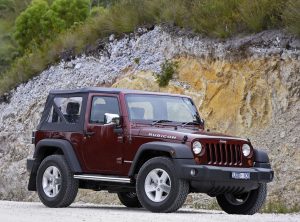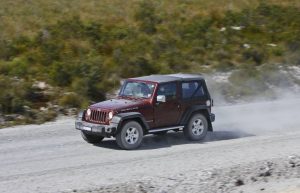Recalls: Jeep JK Wrangler
Overview
Manufacturers, or importers, issue recalls for defects or faults which have the potential to cause injury. Generally, manufacturers will inform the original buyers if their vehicle is subject to a recall and of the steps required to remedy the defect or fault. Please note that the recalls below (if any) are for Australian-delivered vehicles only. Furthermore, the number of recalls should not be taken as an indication of a model’s reliability or its safety more generally.
Recalls: Jeep JK Wrangler
2007 model year Jeep JK Wrangler: engine may stall
In July 2007, a recall was issued for model year 2007 Jeep JK Wrangler vehicles due to the Totally Integrated Power Module being programmed with incorrect software; this could result in the engine stalling under certain operating conditions (PRA 2007/9427).
2006 Jeep JK Wrangler: rear wheels may lock up
In March 2007, a recall was issued for Jeep JK Wrangler vehicles that were manufactured from 9 November 2006 to 8 December 2006 (MDH 110914-120811). In these vehicles, the software programmed into the Anti-Lock Brake System (ABS) control module may cause the rear wheels to lock up under certain braking conditions (PRA 2007/9086).
2007 model year Jeep JK Wrangler: delay in braking
In November 2007, a recall was issued for model year 2007 Jeep JK Wrangler vehicles due to incorrect software programming for the Electronic Brake Control (EBC) module. As a result, there could be a momentary delay in braking when coasting up-hill, increasing the vehicle’s stopping distance (PRA 2007/9686).
2007-08 model year Jeep JK Wrangler: potential brake system loss
In July 2008, a recall was issued for model year 2007 to 2008 Jeep JK Wrangler models due to insufficient clearance between the steering intermediate shaft and the rear brake tubes for some vehicles. Prolonged brake tube contact could wear a hole in the tube and cause a partial brake system loss (PRA 2008/10186).
2008 model year Jeep JK Wrangler: transmission fluid and fire hazard
In May 2010, a recall was issued for 2008 model year JK Wrangler vehicles. In these vehicles, continuous operation under certain conditions may cause the transmission fluid to boil over and come in contact with the hot engine or exhaust components – this defect could cause an underbonnet fire without warning (PRA 2010/12932).
2010 model year Jeep JK Wrangler: loss of power braking assistance
In August 2010, a recall was issued for 2010 model year JK Wrangler vehicles. In these vehicles, the brake tube may have been manufactured with an improperly formed flare that could cause brake fluid to leak. If this occurred, the vehicle’s stopping distance could be increased and this could cause a collision (PRA 2010/12927).
2007-10 Jeep JK Wrangler: loss of power braking assistance
In December 2010, a recall was issued for 2007 to 2010 year JK Wrangler vehicles. In these vehicles, the front fender lines may detach and sag, allowing the fender line to contact one or more of the brake tubes. Continuous fender liner contact with the brake tube(s) could result in a hydraulic leak and reduce braking performance (PRA 2010/12929).
2010-11 model year Jeep JK Wrangler: loose suspension fasteners
In March 2011, a recall was issued for 2010 and 2011 model year Wrangler vehicles. In these vehicles, the select suspension fasteners may not have been tightened properly. As a result, the fasteners may become loose under certain conditoins and adversely affect the stability of the vehicle (PRA 2011/12925).
2010 Jeep JK Wrangler: catalytic converter fire hazard
In July 2012, a recall was issued for Jeep JK Wrangler vehicles manufactured in 2010. In these vehicles, the transmission skid plate may allow debris to collect around the catalytic converter. If an excessive amount of debris were collected, the catalytic converter could ignite it, causing an underbody fire without warning (PRA 2012/13208).
2011-13 Jeep JK Wrangler: short circuit in mirror wiring harness
In December 2014, a recall was issued for JK Wrangler vehicles that were manufactured from 2011 to 2013. In these vehicles, water may travel along the heated power mirror wiring harness and into the electrical connector – this could cause corrosion inside the heated mirror connector and the formation of a resistive bridge between the power and ground electrical terminals. This resistive bridge could cause an electrical fire without warning (PRA 2014/14467).
2007-16 Jeep JK Wrangler: driver’s airbag may not deploy
In June 2016, two recall was issued for Jeep JK Wrangler vehicles that were manufactured from 2007 to 2010 (PRA 2016/15485) and from 2011 to 2016 (PRA 2016/15486). In these vehicles, the clock spring may ingest dust if the vehicle was subject to extremely dusty environments. The presence of dust inside the clock spring could compromise airbag circuits such that the driver’s airbag may not deploy in the event of a collision, increasing the risk of injury; the airbag warning light may also illuminate to warn of the problem.
2005-12 Jeep JK Wrangler: Takata airbag recall #1
In July 2016, a recall was issued for Jeep JK Wrangler vehicles that were manufactured from 2005 to 2012. For these vehicles, propellant wafers within the front passenger airbag may absorb moisture over time – this could cause overly aggressive combustion on deployment such that the front passenger airbag inflator housing may rupture and disperse metal fragments through the cabin. These metal fragments posed a risk of serious injury and death (PRA 2016/15516).
2013 Jeep JK Wrangler: Takata airbag recall #2
In February 2018, a recall was issued for 2013 Jeep JK Wrangler vehicles. Over time, propellant wafers in the passenger airbags of these vehicles could absorb moisture. In the event of a collision, this could lead to overly aggressive deployment of the airbag such that the airbag inflator housing could rupture and metal fragments could be projected throughout the cabin – these fragments posed a risk of serious injury and fatality. For the VINs of the recalled Jeep JK Wrangler vehicles, please see PRA 2018/16617.
2016-17 model year Jeep JK Wrangler: airbag and pre-tensioners may not deploy
In November 2016, a recall was issued for 2016 and 2017 model year Jeep JK Wrangler vehicles. In the event of a collision, the front impact sensor wire(s) on these vehicles detach before the ‘impact signal’ was received by the Occupant Restraint Controller (ORC) module. As such, the airbags and seatbelt pre-tensioners may not deploy, thereby increasing the risk of injury to the front seat occupants (PRA 2016/15741).
2017 Jeep JK Wrangler: brake switches may malfunction
In March 2018, a recall was issued for 2017 Jeep JK Wrangler vehicles because the brake switches could malfunction. If this occurred, the Malfunction Indicator Lamp (MIL) would illuminate, an audible chime would sound and the brake lights may continuously illuminate. A malfunctioning brake switch could also allow the vehicle to be shifted out of ‘Park’ gear without the brake pedal being depressed. If the vehicle was shifted out of ‘Park’ when the brake pedal was not depressed, the ignition was in ‘Run’ mode and/or the rear brakes were continuously illuminated, it may increase the risk of a collision. For the VINs of the recalled Jeep JK Wrangler vehicles, please see PRA 2018/16615.
2014-16 Jeep JK Wrangler: Takata airbag recall #3
In April 2018, a recall was issued for 2014-16 Jeep JK Wrangler vehicles vehicles. The passenger side front airbags of these vehicles had propellant wafers that could absorb moisture over time. In the event of a collision, this could cause overly aggressive deployment of the airbag that could rupture the airbag inflator housing and cause metal fragments to be dispersed throughout the cabin. These fragments posed a serious risk of injury or death. For the VINs of the recalled Jeep JK Wrangler vehicles, please see PRA 2018/16702.
2017-18 Jeep JK Wrangler: engine may stall while driving
In August 2018, recall campaign U87 was issued for 2017-18 Jeep JK Wrangler vehicles. In these vehicles, the powertrain control module could fail and this could cause:
- The vehicle not to start;
- The vehicle to start and then stall immediately; or
- The engine to stall while the vehicle was being driven.
If the latter occurred, the vehicle would pose a collision risk to vehicle occupants and other road users. For the VINs of the recalled vehicles, please see PRA 2018/16976.
Problems and faults: Jeep JK Wrangler
Overview
This section identifies potential problems, causes and fixes based on the experiences of owners and repairers, online sources and technical service bulletins. This information is provided solely for reference purposes and AustralianCar.Reviews recommends that only properly qualified persons carry out repairs or modifications. Furthermore, the number of items below should not be taken as an indicator of a model’s reliability or the frequency with which they may occur.
To report a problem or fault to the AustralianCar.Reviews team, please use the Contact Us form. Note that AustralianCar.Reviews does not offer advice on automotive problems or disputes; such enquiries will not receive a reply. For vehicles purchased from dealers after 1 January 2011, please see our Australian Consumer Law fact sheet.
Jeep JK Wrangler: engine doesn’t start/crank
In July 2008, Technical Service Bulletin 08-007-09 REV A was issued for 2007-08 Jeep JK Wrangler vehicles that were manufactured on or before 5 May 2008 because the engine may not crank or start due to electronic lock-up of the Wireless Control Module (WCM) – also known as the Sentry Key Remote Entry Module (SKREEM) – and the remote keyless entry (RKE) system does not operate. This may occur because of an electrostatic charge within the Wireless Control Module (WCM). To fix, the WCM needed to be replaced.
Jeep JK Wrangler 3.6L: left cylinder head leak
In June 2014, Technical Service Bulletin (TSB) 09-002-14 was issued for Jeep JK Wrangler models with 3.6-litre Pentastar V6 engines that were manufactured before 25 July 2012. In these vehicles, the Malfunction Indicator Lamp (MIL) may illuminate and be accompanied by the following Diagnostic Trouble Codes (DTCs):
- P0300: Multiple Cylinder Misfire;
- P0302: Cylinder 2 Misfire;
- P0304: Cylinder 4 Misfire; and,
- P0306: Cylinder 6 Misfire.
The service bulletin recommended that a cylinder leakage test be conducted on the cylinders exhibiting the misfire DTC. If any of the cylinders exhibited a leakage of 25 per cent or above, the left cylinder head was to be replaced.
Jeep JK Wrangler: Other problems and faults
- The rear door handles may not work – from the outside or inside – if the latch goes out of alignment.



